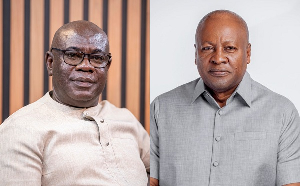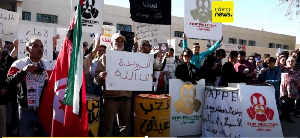.... to take advantage of emerging and future economic opportunities
It is the objective of every country in the world to take advantage of every opportunity that comes her way and then adopt pragmatic economic policies to promote her economic growth, reduce unemployment, reduce poverty, and improve upon the living standards of her inhabitants.
Current economic trends have shown that many African countries have demonstrated impressive economic growths in recent years. Countries like Nigeria, Ghana, Zambia, South Africa, and Tanzania among many other countries have been recognized to be making notable economic progress over the last decade: which has increased the continent’s economic growth to its current average rate of 6%. But the question arises; to what extent has this acclaimed level of economic growth had impact on the life of the ordinary African?, “have Africans been able to grab the opportunities that come with foreign trade and this level of growth that is being talked about and are they really able to take maximum advantage of the opportunities inherent in their economies? Or in other words, are the people in these developing countries well equipped with whatever resources is required to be able to get a better share of emerging economic opportunities in their countries and in the global economy? It is these questions among others that I seek to address in this piece.
Sustained economic growth, low unemployment and reduced poverty as already mentioned are some of the major macroeconomic objectives of every country and these goals can only be achieved by effective and efficient utilization of the economic opportunities that a country is exposed to. In other words, the likelihood of these macroeconomic goals being achieved greatly depends on the ability of citizens of a country to convert economic opportunities into goods and services.
It can be observed that countries that have demonstrated the strongest growth in recent times are countries that have over the years invested heavily in human capital development and as a result currently have a ‘strong’ human capital. Brazil, China and India have recently achieved great economic successes and are collectively bolstering world economic growth, boosting social and economic development in other developing countries, alleviating poverty and increasing wealth on an impressive scale as a result of their adoption and implementation of pragmatic policies, and a strong focus on human capital development. Economic growth in these countries can be seen as a dramatic expansion of individual capabilities and sustained human development progress in the countries.
Unfortunately, African countries over the past years have not given much consideration to the concept of investing into human capital development – which greatly explains why there still remains a high percentage of the population being illiterate in spite of the current rising middle class on the continent. It has become seemingly difficult to fully see the impact of Africa’s increasing economic growth on the lives of its people partly because of the fact that a greater percentage of the people still lack the entrepreneurial, marketing, technical, and management skills to take advantage of opportunities in the economy.
Africa’s economic growth has not been inclusive and its people have not reaped the benefits. There have been persistent levels of poverty despite the current growth trends and this has been as a result of the absence of a diversified economy, poor access to credit and insurance, low human and physical capital and weak systems of social protection. Unemployment rates in African countries have also been increasing over the years despite governments’ efforts to curb the menace?owing to the fact that many working-age adults in the countries lack the literacy and numeracy needed for employment.
As a result, a growing youth population which is supposed to be a positive economic factor has instead become a major economic and social challenge. It is worth acknowledging the fact that very few countries have achieved sustained rapid social and economic growth without high levels of public investment- not just in infrastructure but also in education and health. A skilled workforce is a vital tool and remains an indispensable foundation of sustainable economic growth. As a result, investing in people’s capabilities by providing expanded social services – through health, education/ training and other public services is a key requirement for economic growth and should be given much consideration.
To reduce unemployment, reduce poverty, and achieve sustained growth in incomes and human development as well as accelerate economic growth, there is the need to adopt varying policies dealing with market regulation, export promotion, technological progress and industrial development so as to create a conducive and supportive business environment for people to be able to create and sustain businesses.
Priorities need to be people-centered and be geared towards promoting opportunities while protecting people against downside risks. Current globalization trends have necessitated international trade on the African continent. But it is not enough for African countries to just open up to foreign trade, foreign investment and technologies. There is the need to invest in human development capabilities, fortify domestic institutions and build new areas of comparative advantages. The combination of external openness with internal preparedness will help countries to prosper in the international marketplace, with positive human development outcomes for the population at large.
Africa’s estimated population of 1.033 billion is set to more than double by 2050 and one can imagine what the situation will be like if our societies continue to remain as they are now without increased efforts to develop the capabilities of individuals to create something for themselves and their economies at large. The result will be a doubled pressure on the current facilities available on the continent and a rise in poverty levels. On the contrary, Africa’s population will be its greatest asset if pragmatic steps are taken now to build the continents capacity to harness its human capital in the future.
Building the capabilities of people through education/ training (especially in study areas that are linked with innovation) and creating a supportive environment for indigenes to do business will create strong private sectors which will contribute greatly to the development of African economies both in the interim and the in future. There should also be effective and ‘working’ policies to support people to do business freely and easily with minimum interferences as possible, whiles also providing the needed infrastructure to help reduce the stress and cost in doing business.
The world economy is growing at a faster pace and new opportunities are emerging. Africa has great potentials and great resources that can be capitalized on to inclusively transform the continent economically. But one thing is essential- we must enhance people’s technical ability and willingness to play new developmental roles and adapt to new demands and situations. Great efforts need to be geared towards building knowledge, investing in science, technology and innovation, improving productivity in the informal sector and investing in education and training that matches skills with tomorrow’s job markets. By doing this, Africans will be in a position to ‘capture and utilize’ emerging economic opportunities and also be skilled enough to unleash latent opportunities on the continent. And this will go a long way to improve economic growth, reduce unemployment and reduce poverty.
Charles Yeboah Frimpong Financial Analyst (Economic Business Group) Tel: +233 246 542 642 Email: fycharles.7@gmail.com
Business News of Wednesday, 27 November 2013
Source: Frimpong, Charles Yeboah












